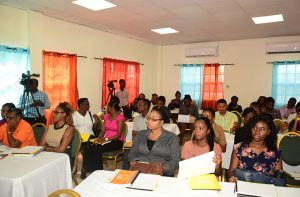– 35 persons to undergo lengthy training to deal with the scourge
ALCOHOL and substance abuse have been closely linked to mental health disorders and diseases that plague the local society, said Director of the Mental Health Unit of the Ministry of Public Heath, Dr. Util Thomas.
Over the years studies locally have discovered that 70 per cent of the patients at the National Psychiatric Hospital have a dual diagnosis of alcoholism and substance abuse.
“Alcohol and substance abuse are interwoven with all the mental health disorders and maladies that plague our society,” said Thomas during the launch of a 19-day drug treatment training programme on Monday.
The programme which is certified by the University of the West Indies (UWI) is being funded by the Organisation of American States (OAS) in collaboration with the Ministry of Public Health and designed to improve the quality of treatment services available for persons with addiction problems.
Dr. Thomas placed direct emphasis on alcohol and substance abuse, noting that persons who are addicted to the two have more frequent relapses and show resistance to treatment.
She made reference to the known suicide issue in Baramita, Region One (Barima-Waini) where persons usually commit suicide while under the influence of alcohol.
“We have been conducting a self-harm surveillance project and what we are finding is that most of the cases of persons indulging in self-harm come from dysfunctional families where alcohol and substance abuse is very prominent,” the director lamented.
Officials of the unit believe that suicide and other mental health matters cannot be addressed without addressing alcohol and substance abuse issues, so they implored the 35 participants of the training programme to pay keen attention to the teachings they will receive.
The main objectives of the training programme are to train and certify drug prevention specialists and drug treatment providers, and improve the quality of treatment services for those with addiction problems.
OAS Resident Representative, Jean Ricot Dormeus said the training seminar is the framework of the OAS’ training and certification programme that provides a solution to the dependency of many drug addicts in Guyana.
The 35 participants who met the requirements of the course will function as drug treatment service providers who are equipped to implement programmes.

In 2016, 32 Guyanese had completed a similar training programme and have since impacted the lives of many people, especially vulnerable youth, said Dormeus.
“At a recent forum, the Minister of Public Security, Khemraj Ramjattan had referred to a study that shows the devastating effects of drug use and trafficking on crime and violence,” he said, adding that the study also alluded to the fact that due to those ills, there have been deaths, injuries and life disruptions in Latin America and the Caribbean that surpass those in war zones.
He believes that the alarming trend calls on officials to do better to protect society from the drug scourge.
“We recognise that drug control policies and strategies require a holistic approach since law enforcement, although necessary, has not been sufficient,” lamented Dormeus.
Soft approaches such as prevention and treatment are needed but the OAS continues to study and explore other suitable options to control the drug influence.
The OAS representative told participants that the skills they receive will help them to make vital contributions to society in terms of controlling the influence of drugs on people.
“You will touch the lives of people in desperate need of assistance,” he said, adding that the OAS through the Inter-American Drug Abuse Control Commission (CICAD) remains committed to helping Guyana and the region in their quest for a better life for all.
Permanent Secretary (PS) of the Public Health Ministry, Collette Adams reminded the participants that they also have a guideline to work with–the National Drug Strategy Master Plan 2016-2020, which also includes the vision and intentions of the ministry.
The strategy promotes the implementation of modern measures and mechanisms that promote the efficient functioning of anti-narcotic structures, in particular, the effective coordination and application of national policies on drugs, among other things.




.jpg)










